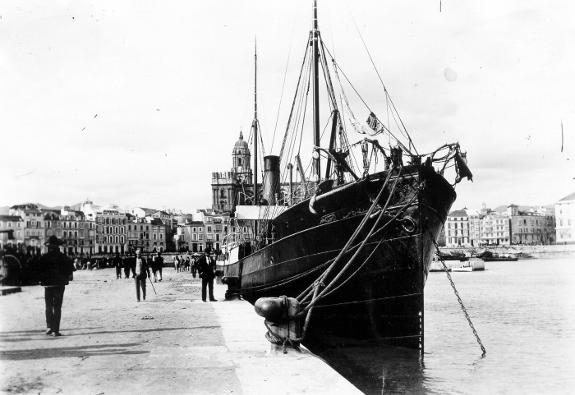The case of the killer potatoes
In the shadow of history. Tragedy on board a ship called Schleswig in Malaga port
víctor heredia
Viernes, 3 de septiembre 2021, 10:02
In the spring of 1914 there was a growing sense that war in Europe was getting closer. The major powers were increasing their preparations for conflict and international tension was increasing. Nevertheless, the early tourism industry continued to operate in the Malaga area.
Tourism was already being seen as something which would boost the local economy. On 16 May members of the Provincial Tourism Board met to consider how Malaga could be represented at the International Exhibition which was going to be held in London, but they came to the conclusion that they could not take part due to the lack of time and preparation. How things would change in the following decades.
The next day, Sunday 17 May, a German tourist ship arrived in Malaga port. It was the Norddeutscher Lloyd company's Schleswig. It had a crew of 206 and was on a pleasure cruise with 144 passengers on board.
Various activities had been organised for the tourists, who were German, Austrian and Italian, during their stay in the city. First they went to a bullfight, on the same day they arrived. On Tuesday 19 they were taken by a special train to Granada to visit the Alhambra. That night, however, when they returned to the ship, they discovered that a tragedy had occurred. It was covered at the time by a reporter from El Popular, a local newspaper of which some issues are still in existence today.
Around 3pm, the head of supplies had gone down to the ship's number four hold, where food was stored, especially barrels of potatoes and sacks of flour and rice. When he took a long time coming back, the cook sent another sailor to go and find him, but he also failed to return. A third crew member was sent to tell them to hurry up. And then a fourth went down to see what on earth was going on.
When the fifth crew member was ordered down to the hold, he decided to proceed with great caution. As he approached, he began to feel as if he couldn't breathe properly, and it was only with great difficulty that he managed to make it back on to deck.
He warned that something very strange was happening down below and one of the ship's carpenters was sent down to the hold, wearing a diving mask. When he went in, he found the Dantesque sight of his four colleagues' bodies collapsed on top of the sacks of potatoes. The doctor for the German colony in Malaga, Dr Brausewetter, and the deputy director of the Sanitary Station at the port tried to revive them, but were unsuccessful. The survivor received assistance, and his condition improved after a few hours.
Soon afterwards the consul of the German Empire, Rudolf Frömke, arrived with representatives of the ship's consignee company, Baquera, Kuche y Martin, which was responsible for looking after the tourists during their stay in Malaga.
They immediately began investigating the cause of the sailors' deaths, with the help of chemist Enrique Laza Herrera, who came to the conclusion that they had fallen unconscious as soon as they went into the hold and died within minutes, asphyxiated by the build-up of toxic gases.
The lack of ventilation was a major factor in this tragedy. It seems that the hold had not been opened for some time and the fermentation of the foods stored inside had created a lethal atmosphere.
The victims were German Gustav Friedrich, who was in charge of supplies; Karl Friedrich Herel, sailor; Rudolf Karl Malorny, carpenter, and Johannes Niewards, a trainee seaman. Doctor Brausewetter certified the cause of their deaths without needing to carry out an autopsy.
That same night the victims' bodies were driven to the San Miguel cemetery and one, who was a Catholic, was buried there. The other three, who were Protestant, were buried in the adjoining civil cemetery.
The fact that they were not buried in the English Cemetery shows the high degree of tension between Germany and Great Britain at that time.
Many local people attended the burials, as did members of the German community, members of the ship's crew who were off duty, and the ship's passengers, but none of the Malaga authorities were present.
Enrique Laza concluded that the fermentation of the rice and the potatoes had absorbed the oxygen in the hold in a process of slow, or flame-free combustion, which created carbonic acid.
This type of accident, which causes a 'soft' death because the victim loses consciousness before the asphyxia takes hold, has sadly been common in ships, storerooms and other closed, unventilated spaces where products which can generate toxic gases are stored.
It took an entire day to remove the 300 tonnes of rice bran which remained in the Schleswig stores. That night, however, after the hold had been emptied and the dead sailors buried, the ship set off for Tangier, the next port of call for the group of tourists.
